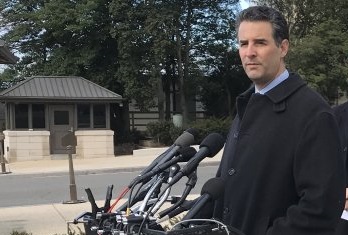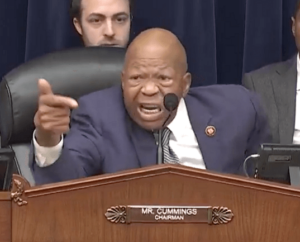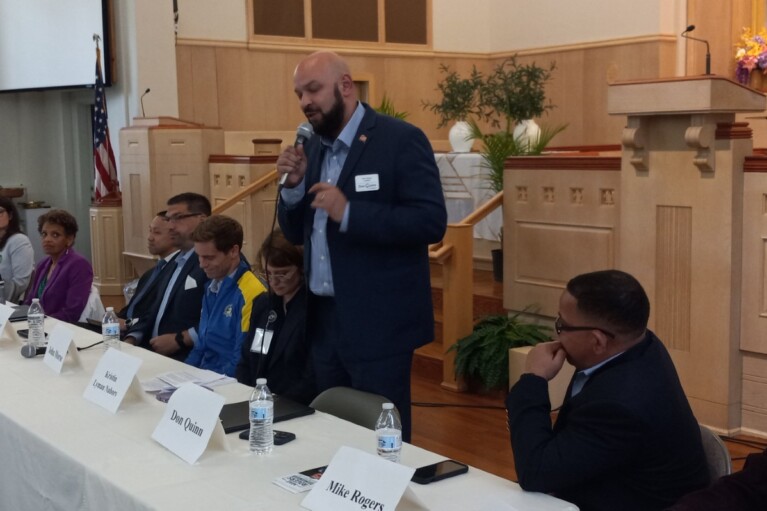U.S. House Wants to Send Message With Bill That Won’t Pass the Senate

Congressman John Sarbanes is charging ahead on a dead-end political mission.
The Maryland Democrat is the lead sponsor of HR 1, the House Democrats’ sweeping and symbolic bill that wraps together their top anti-corruption and voting rights priorities.
It’s got no hope of passing through the Republican-controlled Senate, where Majority Leader Mitch McConnell (R-Ky.) snubbed the legislation as a Democratic “power grab.” The bill — which would require presidential candidates to release their tax returns — doesn’t stand a chance with President Donald Trump, either.
But getting it signed into law isn’t Sarbanes’ only objective.
“Our view has always been that you start where you can,” Sarbanes told Maryland Matters in an interview last week.
Passing the bill in the House would create “new dynamics” on Capitol Hill, he said. It’s a way of telling the public that when you give the gavels to people interested in change, this is the kind of change you can expect to see, he added. If senators don’t appear interested, “you might want to give the gavel to somebody else.”
He’s hoping to see the bill passed in the chamber in early March.
He sees the voting rights, government ethics and campaign finance provisions in the bill as useful political tools for Democrats. Lawmakers who don’t get on board “will face political consequence in the 2020 election,” he said.
But he doesn’t see his legislation as exclusively a messaging bill.
“We’re very confident that all of the components of this bill are ones that belong in law and would make a huge difference and were favored by broad, broad majorities of the American public,” he said. “It’s definitely ready for prime time as something to be signed into law, not just cobbled together for talking points or messaging points.”
That said, “As a messaging opportunity, it’s sort of a very deep well.”

U.S. Rep. Elijah Cummings (D-Md.) delivers a fiery speech to the House Oversight and Reform Committee.
House Democrats have already held several hearings on various provisions of the bill. Another Maryland Democrat, House Oversight and Reform Committee Chairman Elijah Cummings, got emotional earlier this month at one such hearing. He recounted how his mother’s dying words to him were a plea to protect Americans’ voting rights.
Sarbanes, the chairman of the House Democrats’ Democracy Reform Task Force, said the bill represents the culmination of his work in his 12 years in Congress.
He’s long heard “cynicism about how Washington works” from members of the public, who think the system is “rigged against them.” And “they’re not too far off the mark with that when you look at this ecosystem of influence peddling that’s been built in Washington over the past few decades,” he added.
The sweeping bill pulls together a host of other proposals that had been previously introduced.
“We definitely did not have to start from scratch,” Sarbanes said.
Some of those ideas gained traction in campaigns last year during as Democratic candidates were running for office.
“We started to see how the candidates that were running were really leaning into this anti-corruption message, because they were seeing how much traction and resonance it was getting with the electorate,” Sarbanes said.
House Speaker Nancy Pelosi (D-Calif.) “implicitly understood that you can’t go do all the other things that matter on policy … if the system is rigged in favor of big industries and insiders,” he said. By the time Democrats won control of the House, it became clear that “this shouldn’t just be among the first things we do, but it ought to be actually the first thing that we introduce.”
The rollout was a big moment for Sarbanes.
“It’s certainly a proud achievement to have it be the first bill introduced by Democrats after eight years of having been in the minority,” he said.
Among other things, Sarbanes’ bill would require states to establish independent redistricting commissions.
Redistricting has been a thorny issue in Maryland, where Republican Gov. Lawrence J. Hogan Jr. late last year selected members of a nonpartisan commission to redraw the districts.
Some Democrats — including freshman U.S. Rep. David J. Trone — are defending the lines drawn by state Democrats after a federal court ruled that the current map is unconstitutional. The U.S. Supreme Court is slated to hear an appeal in that case March 26.
Sarbanes said he understands why Hogan has moved forward with the commission, calling the drive for a fair process the same sentiment that motivated that section of HR 1.
But, Sarbanes said, he wants the reforms to be national and not state by state.
“I just don’t think you can implement that kind of a solution in some places and not others,” he said. That could end up “intensifying the political battle in the places where you don’t have those commissions.”
Ultimately, he said, “Voters should pick the politicians, not the other way around.” And “Democrats and Republicans need to live by the same set of rules on that.”
Robin Bravender is Washington bureau chief for States Newsroom.



 Creative Commons Attribution
Creative Commons Attribution